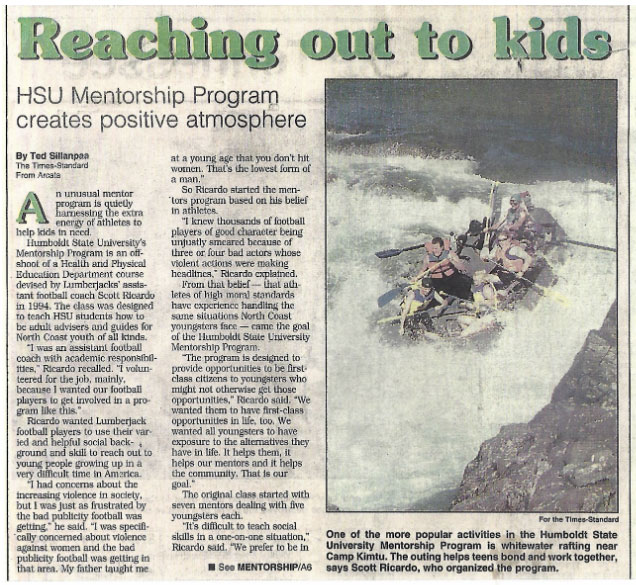
Cal Poly, SLO Alumni Magazine Fall 1998
Scott Ricardo (PE ’77) professes that his heart lies in two places. As a nine-year offensive coordinator for Humboldt State’s Lumberjacks, he declares, “Football is my life.” However, as the director of the university’s Youth Mentorship Program, Ricardo claims the mentorship program as his passion. “My vision is to help youth across the nation.” Four years ago, Humboldt State University’s administrators asked Coach Ricardo to teach a new class. After kicking around a few ideas, he hit on the concept of working with at-risk youth.
“I wanted a program that would provide opportunities for youngsters to believe that they are first-class citizens,” he says. “I’m tired of crime, violence against women, and athletes receiving a bad reputation.” So Ricardo matched at-risk youth with street- smart athletes to help reduce violence.
The mentorship program now trains more than 40 mentors – most of whom are university athletes from various men’s and women’s sports – and there is a waiting list to take the course. “It’s popular because student athletes want to give back to the community,” says Ricardo.
All mentors are screened with background checks, fingerprints, and interviews. “Then I train them as a staff,” he says. “There are no tests.” Ricardo calls it “service learning” – learning how to be teachers with hands-on experience, not just lectures.
Ricardo’s program trains mentors to foster year-long relationships with local middle- and high-school youth. In addition to annual special activities, like college tours and white-water rafting trips, mentors are required to spend time with their mentees at least once or twice a week on a variety of activities, such as learning to use computers, doing artwork, or participating in athletics.
“What’s exciting is the mentors are getting hooked on being positive role models, and most are showing interest in teaching,” he says. Ricardo is proud that organizations like the Humboldt County Office of Education and GRIP (Gang Risk Intervention Program) are lining up to hire graduating mentors.
Ricardo earned a master’s degree in athletic administration from Washington State University while coaching football there. Previously he coached part time at UC Berkeley and before that student taught at Morro Bay High School. But, he says, he received his foundation in training while at Cal Poly.
“I learned a lot from Dr. [Robert] Mott about how to give educational workshops, ” Ricardo says. “And you could say most of my current training is through self- education, although I do consult with professionals on conflict management and self-esteem for my workshops.”
One of Ricardo’s goals is for an agency to adopt this program nationally. “I see the joy in children’s faces, and I know it works,” he says. In the meantime, Ricardo will continue to speak atnational conferences, including the American Football Coaches Association and National Athletic Association Directors Convention, to educate people about programs like his, because, he repeats, “They just simply work.”
